SPECIAL REPORT : Part 433
By Shamindra Ferdinando
The Sri Lanka Institute of Directors (SLID) and Transparency International Sri Lanka (TISL) recently declared corruption as the root cause of Sri Lanka’s current political and economic crisis. The declaration was made in a statement titled, “SLID and TISL launch ‘Business Against Corruption’ Initiative” issued to the media after the two organisations finalised an agreement on a three-year plan to address the issues at hand.
The statement described the contract as strategic collaboration between the two NGOs. Veteran banker Faizal Salieh and Attorney-at-Law Nadishani Perera signed the agreement for SLID and TISL, respectively.
TISL was launched in late 2002 whereas SLID came into being in April 2000. The assertion that corruption bankrupted the country underscored the failure on the part of successive governments (parliaments), the Finance Ministry, Monetary Board, CIABOC, Attorney General’s Department and the Auditor General’s Department, as well as apparent well-meaning bodies, like SLID and TISL. The way the political party system hindered and diluted the National Audit Bill and the Parliament moved court against the releasing of MPs’ asset declarations indicate the challenges faced in reforming the system.
No less a person than the Governor of the Central Bank Dr. Nandalal Weerasinghe, in May this year, acknowledged Sri Lanka’s shameful status. Dr. Weerasinghe, who retired as Senior Deputy Governor, CBSL in January 2021, was requested to take over the CBSL in April this year in the wake of Ajith Nivard Cabraal’s resignation amidst an unprecedented deterioration of the country’s financial situation.
Nadishani Perera succeeded as TISL’s Executive Director from Asoka Obeysekera in January 2021. Salieh was unanimously elected as the Chairman, SLID for the year 2021/22 at a virtual AGM held on Aug. 11, 2021. It would be pertinent to mention that the then State Minister of Finance, Capital Markets and State Enterprise Reforms Cabraal was the Chief Guest at this meet held a month before Central Bank Governor Prof. W.D. Lakshman was unceremoniously asked to step down to pave the way for the State Minister to return to the Governor’s Office.
Cabraal previously served as the 12th Governor of CBSL from July 2006 to January 2015 and returned. His second stint as the 16th Governor, CBSL lasted just eight months. As the 16h Governor he was elevated to the Cabinet rank. As a result, the Governor’s rank in the Table of Precedence has gone up from 20th to fifth place. The Governor is now ranked below the President, Prime Minister, Speaker and the Chief Justice.
In joint fifth place, the Table of Precedence comprises the Leader of the Opposition, Cabinet of Ministers and the Field Marshal.
When Cabraal succeeded Prof. Lakshman the government was in serious difficulty. Having ignored the IMF’s advice in early 2020 to restructure the debt and drop plans to do away with a range of taxes, the then President Gotabaya Rajapaksa’s government caused immense damage to the national economy. But the economic fallout cannot be entirely blamed on corruption since the country had to fend off the worldwide pandemic and the 2019 Easter Sunday terror attacks by Islamic extremists, both of which crippled the country’s vibrant and vital tourism industry and worker remittances, coupled with the fallout from the war in Ukraine.
Nadishani Perera declared their primary objective was to eradicate corruption supported by the private sector. She said so in response to a query from us. They’ll be seeking required funding from the ADB, World Bank and other institutions such as the Centre for International Private Enterprise (CIPE).
A toxic combination of waste, corruption, irregularities, mismanagement and ill-advised decisions contributed to the worst-ever crisis post-independence Sri Lanka experienced. Both public and private sectors should accept responsibility for the crisis. Shocking disclosures made by the Auditor General and at proceedings of the Committee of Public Enterprises (COPE), Committee of Public Accounts (COPA) and Committee of Public Finance (COPF) over the years repeatedly proved culpability of Parliament for the financial crisis.
The SLID-TISL project is meant to enhance transparency, accountability and integrity by encouraging ethical business practices, fair market competition, fair pricing and credible leadership.
The joint statement quoted Salieh as having said: “We are mindful of the current state of affairs, the ground realities, and the challenges faced by companies in doing business. Therefore, our approach on this journey is pragmatic and practical and will enable businesses to proactively and progressively mitigate the corruption risk using preventive measures, checks and balances on a voluntary, ‘best efforts’ basis.”
Nadishani Perera was quoted as having said: “Businesses play a critical role in any nation’s efforts against corruption. At this unique and transformative moment in Sri Lanka’s history, as the citizens have risen against corruption, it is of utmost importance that the business community also commits to do its part towards this mission.”
Bond scams
In spite of high-profile projects reportedly meant to restore public confidence in public and private sectors, the situation continues to deteriorate. That is the undeniable truth. In late Nov 2016, the USAID in partnership with Sri Lanka Parliament launched USD 13 mn (Rs 1.92 bn) project to strengthen accountability, transparency and good governance.
Parliament owed the public an explanation as regards the success or utter failure of the three-year project. Did it achieve its objectives? Perhaps, the then Speaker Karu Jayasuriya, in his new capacity as the Chairman of the National Movement for Social Justice (NMSJ) will care to explain the outcome of the USAID project. The USD 13 mn project should be examined against the backdrop of the Treasury bond scams perpetrated in Feb 2015 and March 2016 under then yahapalana (good governance) rule. Then Speaker Jayasuriya and the US obviously didn’t care that the yahapalana government delayed investigations into the Treasury bond scams and actually nothing really was done about it until then President Maithripala Sirisena appointed a presidential Commission of Inquiry (CoI) that included two sitting Supreme Court judges in late January 2017 to carry out a public probe.
Probably, Sirisena, now an SLPP MP (Polonnaruwa district) must have quite conveniently forgotten how he dissolved Parliament at midnight on June 26, 2015 to prevent the then COPE Chairman D.E.W. Gunasekera from tabling in Parliament his report on the first Treasury bond scam. At the behest of the UNP leadership, the then lawmaker Attorney-at-Law Sujeewa Senasinghe moved court to thwart the releasing of the COPE report. Senasinghe, an Attorney-at-Law even had the audacity to write a book denying the scam.
Regardless of Perpetual Treasuries Limited (PTL) being under the spotlight over the Treasury Bond scams, the Bar Association of Sri Lanka (BASL) had no qualms in receiving sponsorship amounting to Rs 2.5 mn in support from the tainted firm for its project, Law Asia 2016. The Colombo Port City and the USAID had been among the BASL’s sponsors for its other events.
Eight years after the first Treasury Bond scam, what is the current status of the investigations and Sri Lanka’s efforts to convince Singapore to extradite Arjuna Mahendran, under whose watchful eyes as the Governor, CBSL the Treasury Bond scams took place? Can the Attorney General and the Justice Ministry explain measures taken by them since the change of government in July to have Mahendran extradited? Against the backdrop of assurances given by the Justice Minister Dr. Wijeyadasa Rajapakse, PC, that a Bill to combat fraud and corruption would be enacted soon, the public have a right to know how the new government intended to handle Treasury Bonds scams probe/prosecutions.
Singapore-based Mahendran challenged The Island editorial (‘Cops and Robbers’) of Friday August 19, 2022. Denying he fled the country, the Singaporean revealed that his Counsel Romesh de Silva, PC secured the permission of Supreme Court justice K.T. Chitrasiri for him to leave the country. Justice Chitrasiri headed the CoI. The issue at hand is whether Mahendran through his learned Counsel gave an assurance to Justice Chitrasiri that he would return to the country in case the Attorney General initiated legal action over the Treasury Bond scams. Perhaps, Mahendran’s Counsel should set the record straight.
The question is when President’s Counsel Romesh de Silva made the request on behalf of Mahendran and secured approval as the former CBSL Governor claimed, did he give an assurance to the CoI that he would return within a specific period or did the CoI sought such a pledge from him.
Vidanapathirana Associates, on behalf of Ranil Wickremesinghe, several weeks after the last presidential election in Nov 2019, responded to a spate of allegations pertaining to Treasury Bond scams et al directed at the former Premier by yahapalana regime President Maithripala Sirisena. Responding to specific allegation that Wickremesinghe helped Mahendran to escape Sri Lankan justice, Vidanapathirana Associates stated (verbatim): “Mr. Arjuna Mahendran gave evidence before the Presidential Commission and therefore obtained its permission to leave Sri Lanka. He has not returned since then.”
The Attorney General’s Department should inquire into the circumstances under which Mahendran left the country.
Controversy over privatization
Restructuring/privatization of loss-making state enterprises has received attention as part of the overall economic recovery efforts. However, rebel SLPP lawmaker Dr. Nalaka Godahewa recently raised the possibility of the new government exploiting the current economic crisis to privatize profit-making ventures, such as Sri Lanka Insurance Corporation (SLIC) and Sri Lanka Telecom. The former Viyathmaga activist was responding to President Ranil Wickremesinghe’s recent declaration as regards privatization.
Declaring his whole hearted support for the proposed restructuring of loss-making enterprises, Dr. Godahewa however questioned the move to privatize the profitable ventures. Such privatizations will further weaken the public sector due to the Treasury being deprived of much needed cash. Dr. Godahewa assertion that the vast majority of 94 state enterprises privatized between 1990-2003 during the tenure of late President Ranasinghe Premadasa and ex-President Chandrika Bandaranaike Kumaratunga were profitable ventures reveals how the powers that be gradually deprived the Treasury of wherewithal.
The lawmaker while making reference to the controversial circumstances China secured the Hambantota port on a 99-year-lease for USD 1.2 bn in 2017, questioned the move to privatize SLIC and SLT.
Commenting on what he called Sri Lanka’s infamous privatization policy, Dr. Godahewa mentioned a few interesting facts regarding the privatized enterprises though he refrained from naming them. (1) The Supreme Court in 2009 reversed the sale of SLIC for Rs 6 bn during the tenure of Kumaratunga’s regime. At the time of the transaction, the SLIC had assets estimated to be worth over Rs 30 bn (2) The Supreme Court also in the same year reversed two more corrupt transactions, namely Waters Edge and Lanka Marine Services (3) A person who bought a plantation company earned a 100 percent profit within 24 hours after he sold the same property for double the amount he paid for (4) Those who acquired a company that dealt with food much more cash they paid for that particular state enterprise. That enterprise had more money in its bank accounts and the safes than what was received by the government from the buyer and (5) Some of those buyers earned massive profits by selling machinery and equipment.
So, no wonder she was dubbed Chaura Regina (bandit queen) by her one-time political soulmate Victor Ivan in a book he published and to this date ex-President Kumaratunga has not dared to challenge the accusations either in a court of law or by word.
The whole privatisation/restructuring programme appeared to have been carried out at the expense of the national economy while successive governments packed the public enterprises with their supporters. But the massive expansion of the public sector took place at the behest of Mahinda Rajapaksa, who served as the President from Nov 2005 to January 2015.
Public Administration Secretary Priyantha Mayadunne didn’t mince his words a few months ago when he declared how the public service had become an unbearable burden to the taxpayer. But why didn’t he speak up earlier? Mayadunne explained how the public service had been recklessly expanded to nearly 1.5 mn whereas the requirement was 500,000. One-time Justice Ministry Secretary Mayadunne emphasized the need to restructure the public service. Mayadunne’s warning to political parties represented in Parliament, state and private sector trade unions and the civil society that they will soon be categorized as traitors unless they agreed to far reaching economic reforms appeared to have fallen on deaf ears.
Regardless of consequences, the government and the Opposition seemed still struggling to score petty political points than reaching a consensus on workable solutions to address grave political, economic and social issues. Their failure to agree on urgently needed reforms agenda is evidence that the public cannot depend on political parties represented in parliament. Instead of addressing issues at hand, particularly the internationally supervised debt restructuring plan, those who are responsible for the economic fallout seemed determined to consolidate their positions while pursuing the same old strategies.
The government owed an explanation as regards accusations pertaining to the planned privatization of the SLIC and SLT.
TISL’s corruption index
According to TISL’s most recent Corruption Perception Index (2021) Sri Lanka is ranked 102nd out of 180 countries and territories by their perceived levels of public sector corruption. This assessment is certainly questionable. If corruption allegations directed at decision-makers, both in and outside Parliament, are properly examined taking into consideration the responsibilities of the executive, members of the legislature as well as the judiciary, Sri Lanka must be among the worst lot. The proceedings of the parliamentary watchdog committees, periodic reports released by them as well as the Auditor General’s reports paint a bleak picture. The SLID and TISL should inquire into public enterprises as the former represents nearly 1,000 personnel at top management level at state and private sectors. Instead of taking tangible measures to tackle waste, corruption, irregularities and mismanagement, the anti-corruption project could become yet another lucrative trade.
Former Samagi Jana Balavegaya lawmaker Ranjan Ramanayake declared as he left Welikada prison last Friday (26) that Justice Minister Dr. Wijeyadasa Rajapakse, PC, asked for a guarantee from him that he would continue his anti-corruption campaign. The declaration was made after Ramanayake serving a four-year term of RI for contempt of judiciary received a presidential pardon after he publicly acknowledged there was no basis for accusations, he directed at the judiciary on Aug 21, 2017 outside Temple Trees. The former MP apologized to the judiciary while promising not to say anything inimical to the judiciary ever again. Obviously, those who had gathered outside Welikada prison to welcome Ramanayake didn’t really comprehend the implications of the politician going back on his much-publicized declarations. During his tenure as a UNP MP, Ramanayake twice lashed out at the judiciary. In respect of the second case the Supreme Court sentenced him to two years RI suspended for five years.
There had never been a proper inquiry into Ramanayake’s audio tapes though they captured the attention of the public. The releasing of audio tapes of conversations among SSP Shani Abeysekara (he hadn’t been appointed Director CID then), the then Deputy Minister of Social Empowerment Ranjan Ramanayake, the then High Court judge Mrs. Padmini Ranawaka and President Maithripala Sirisena, in the wake of the 2019 Presidential Election, sent shock waves through political parties, the judiciary, the police and the civil society.
Controversy still surrounds the circumstances under which the police received the recordings, secretly made by Ramanayake. Selected tapes were released to both the print and electronic media. Attempts to hush up the shocking revelations, pertaining to the Himbutana killings (Bharatha Premachandra killing), and the subsequent judgment failed.
Those in authority conveniently refrained from conducting a proper investigation into the scandalous interventions made by Ramanayake, as well as the conduct of HC judge Mrs. Ranawaka, and Abeysekara, though the police recorded some statements, including that of Mrs. Ranawaka.
Parliament suppressed the matter. The then Speaker Karu Jayasuriya should explain what really happened. Jayasuriya was among those who called for presidential pardon for Ramanayake. The failure to examine Parliament’s pathetic response to the disturbing revelations and the suppression of CDs is a matter for concern.
Did Ramanayake speak to High Court Judge Mrs. Ranawaka to influence the murder conviction against Duminda Silva, sans permission from the party leadership? Did the then top UNP leadership tell him to approach judges in respect of various cases?
Ramanayake is also on record phoning High Court judge Gihan Pilapitiya and Magistrate Dhammika Hemapala. Following the disclosure of a fraction of the tapes, the police recorded statements from Mrs. Ranawaka (retired), Pilapitiya and Hemapala.
Let me focus on the conversations involving Mrs. Ranawaka, Ramanayake, Abeysekara and President Sirisena (now SLPP Polonnaruwa district MP. Sirisena also remains the SLFP leader).
Mrs. Ranawaka had no qualms in declaring that she had no confidence in President Sirisena though she subsequently directly pleaded with him to promote her to the Court of Appeal. Mrs. Ranawaka expressed doubts about President Sirisena when Ramanayake phoned her on July 14, 2016, in the wake of Abeysekara expressing serious concerns over the way the Duminda Silva matter, and related issues, were proceeding to their dislike. Nearly two dozen conversations, involving Ramanayake and Abeysekara, should have been examined without taking them in isolation. According to conversations now in public domain, Mrs. Ranawaka asked Ramanayake to intervene on her behalf when the latter pressed her on the pending judgment on the Himbutana killings. The judge also made reference to the then lawmaker and Attorney-at-Law Ajith P. Perera during her conversation, initiated by Ramanayake. The way the conversation continued, clearly indicated that the call taken by Ramanayake, on July 14, 2016, couldn’t have been the first and they knew each other very well. Mrs. Ranawaka, obviously exploited Ramanayake’s intervention to explore the possibility of moving up the ladder with unbridled political patronage.
Let there be a thorough inquiry into matters of concern. A genuine effort is needed.
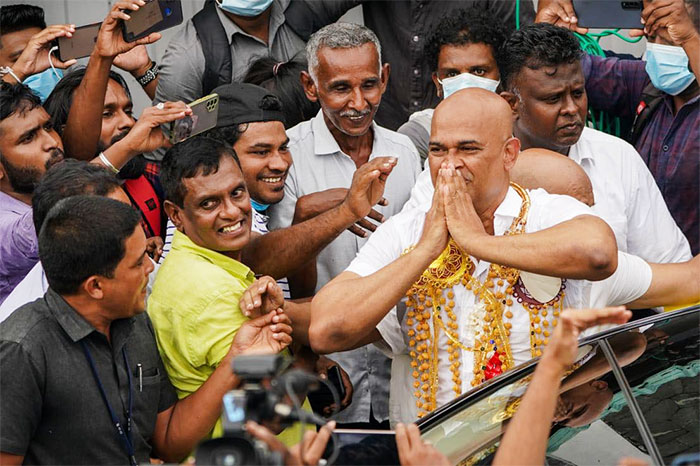
 In spite of high-profile projects reportedly meant to restore public confidence in public and private sectors, the situation continues to deteriorate. That is the undeniable truth. In late Nov 2016, the USAID in partnership with Sri Lanka Parliament launched USD 13 mn (Rs 1.92 bn) project to strengthen accountability, transparency and good governance.
In spite of high-profile projects reportedly meant to restore public confidence in public and private sectors, the situation continues to deteriorate. That is the undeniable truth. In late Nov 2016, the USAID in partnership with Sri Lanka Parliament launched USD 13 mn (Rs 1.92 bn) project to strengthen accountability, transparency and good governance.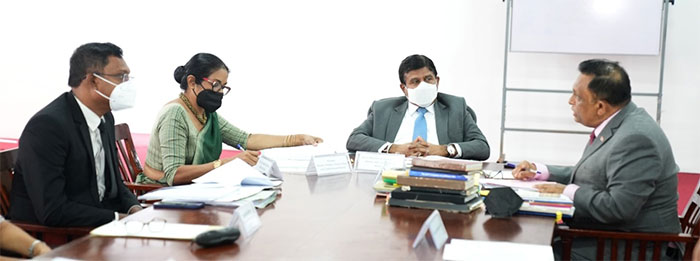
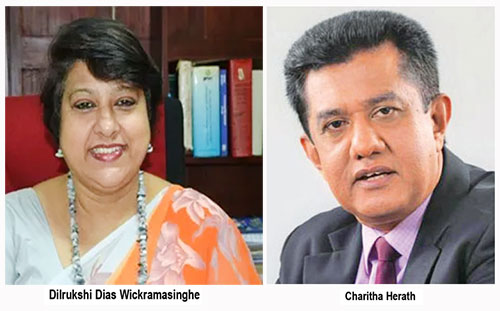 After Sri Lanka’s triumph over separatist Tamil terrorism, the then President Mahinda Rajapaksa vowed to eradicate corruption. But, just over a decade later, waste, corruption, irregularities and mismanagement, at every level of administration, has resulted in the country being declared bankrupt. The need to carefully examine the responsibility as well as the accountability on the part of the executive, the legislature and the judiciary cannot be ignored. The legislature should accept the major blame as public finance and enactment of new laws are its responsibility.
After Sri Lanka’s triumph over separatist Tamil terrorism, the then President Mahinda Rajapaksa vowed to eradicate corruption. But, just over a decade later, waste, corruption, irregularities and mismanagement, at every level of administration, has resulted in the country being declared bankrupt. The need to carefully examine the responsibility as well as the accountability on the part of the executive, the legislature and the judiciary cannot be ignored. The legislature should accept the major blame as public finance and enactment of new laws are its responsibility.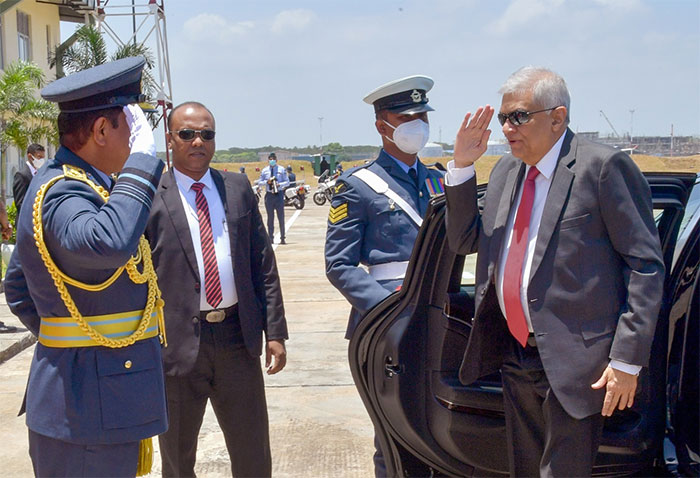
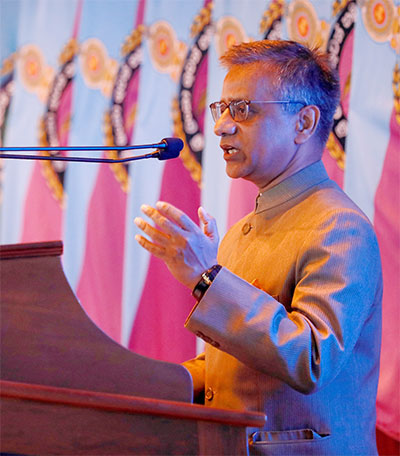 Speaking on the occasion, High Commissioner Gopal Baglay emphasized
Speaking on the occasion, High Commissioner Gopal Baglay emphasized